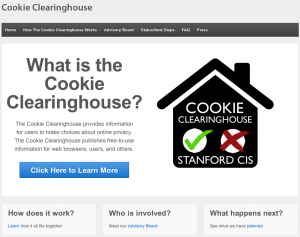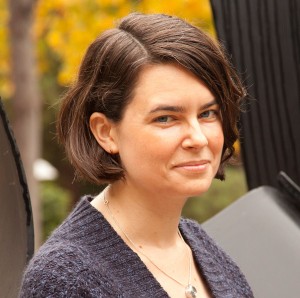Stanford Law School Center for Internet and Society Launches Cookie Clearinghouse to Enable User Choice for Online Tracking
STANFORD, Calif., June 19, 2013 — The Center for Internet and Society (CIS) at Stanford Law School launched a new online privacy initiative today called the “Cookie Clearinghouse,” which will empower Internet users to make informed choices about online privacy. The Cookie Clearinghouse is being spearheaded by Aleecia M. McDonald, the Director of Privacy at CIS.

Websites may place small files called “cookies” on an Internet user’s machine, and some types of cookies can be used to collect information about the user without his or her consent. The Cookie Clearinghouse will develop and maintain an “allow list” and “block list” to help Internet users make privacy choices as they move through the Internet. The Clearinghouse will identify instances where tracking is being conducted without the user’s consent, such as by third parties that the user never visited. To establish the “allow list” and “block list,” the Cookie Clearinghouse is consulting with an advisory board that will include individuals from browser companies including Mozilla and Opera Software, academic privacy researchers, as well as individuals with expertise in small businesses and in European law, and the advisory board will continue to grow over time. The Clearinghouse will also offer the public an opportunity to comment. With this input, the Clearinghouse will develop an objective set of criteria for when to include a website’s cookies on the lists. The Clearinghouse will create and maintain the lists. Browser developers will then be able to choose whether to incorporate the lists into the privacy options they offer to consumers. Company websites with cookies that have been included on the “block list” will be able to respond to the Clearinghouse to correct any mistakes in classification.

“Internet users are starting to understand that their online activities are closely monitored, often by companies they have never heard of before,” said McDonald, “But Internet users currently don’t have the tools they need to make online privacy choices. The Cookie Clearinghouse will create, maintain, and publish objective information. Web browser companies will be able to choose to adopt the lists we publish to provide new privacy options to their users.”
The need for the Clearinghouse evolved out of an effort by CIS fellows called Do Not Track. Initially, Stanford’s Do Not Track work raised consumer awareness about the way in which “tracking cookies” are used by websites—and by unaffiliated third parties—to compile extensive individual browsing histories that provide those companies with data about individual consumer behavior. This effort has since progressed to a global standards effort led by the World Wide Web Consortium (W3C.) More recently, CIS researchers began a new effort to prevent companies from tracking without the user’s consent. CIS student affiliate Jonathan Mayer wrote a software patch for use in Mozilla’s Firefox browser that limits third-party tracking through cookies. Mayer’s patch mimics existing functionality in the Safari browser, which already prevents tracking from websites users have not visited. While Do Not Track efforts continue into their third year, the Cookie Clearinghouse is a new opportunity to accelerate Internet users’ ability to make effective online privacy choices.
For more details, please visit the Cookie Clearinghouse: http://cch.law.stanford.edu
About Aleecia M. McDonald
Dr. Aleecia M. McDonald is the Director of Privacy at Stanford’s Center for Internet & Society. McDonald’s research includes behavioral economics and mental models of privacy, and the efficacy of industry self-regulation. McDonald co-chaired, and remains active in, the WC3’s Tracking Protection Working Group, an ongoing effort to establish international standards for a Do Not Track mechanism that users can enable to request enhanced privacy online. This effort brings together over 100 international stakeholders from industry, academia, civil society, privacy advocates, and regulators. The group is chartered to reach an open, consensus-based multi-party agreement that will establish a baseline for what sites must do when they comply with an incoming request for user privacy. McDonald’s decade of experience working in software startups adds a practical focus to her academic work, and she was a Senior Privacy Researcher for Mozilla (part-time, 2011-12.) She holds a PhD in Engineering & Public Policy from Carnegie Mellon.
About the Center for Internet & Society
Led by Faculty Director Professor Barbara van Schewick, the Center for Internet and Society (CIS) is a public interest technology law and policy program at Stanford Law School and a part of Law, Science and Technology Program. CIS brings together scholars, academics, legislators, students, programmers, security researchers, and scientists to study the interaction of new technologies and the law and to examine how the synergy between the two can either promote or harm public goods like free speech, innovation, privacy, public commons, diversity, and scientific inquiry. CIS strives to improve both technology and law, encouraging decision makers to design both as a means to further democratic values. CIS provides law students and the general public with educational resources and analyses of policy issues arising at the intersection of law, technology and the public interest.
About Stanford Law School
Stanford Law School is one of the nation’s leading institutions for legal scholarship and education. Its alumni are among the most influential decision makers in law, politics, business, and high technology. Faculty members argue before the Supreme Court, testify before Congress, produce outstanding legal scholarship and empirical analysis, and contribute regularly to the nation’s press as legal and policy experts. Stanford Law School has established a new model for legal education that provides rigorous interdisciplinary training, hands-on experience, global perspective and focus on public service, spearheading a movement for change.
